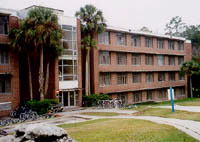Brad Guy
是佛羅里達大學環境與建設中心過渡時期的領導人。其工作著重於綠化建築與社區保育發展。
05.12.00 星期五
Gainsville, 佛羅里達州
也許有人會覺得我花那麼多時間在夢想拆除建築物上,實在不是什麼非常有環保意識的事。事實上,我並不希望看到這些建築物被拆除。我所希望看到的是建築環境能在各方面都能改善:變得更健康、有更高的標準,更能節約能源與其他資源 (在美國,每年約有35%的二氧化碳排放來自建築物的建設與運作),簡單的說就是更人性化一點。城市居民的環境是文化的表徵,同時也為居民的生活提供了美學與功能上的價值。文化應從未經任何人工雕琢的自然與已為人工所利用的資源這兩方面去了解,而不只是從消費與人口的觀點;因為能榮耀我們生活的文化將擁有更多的精華。
拋開這些冥思,真實的世界還是一樣的在運轉。今早的第一件事是:我們剛跟佛羅里達大學校園計畫的人開會,他們之中有些人曾提出在今年秋天拆除Hume Hall的建議,這是一棟占地133,000平方呎的宿舍大樓。他們將進行各種嘗試來看看拆除後留下的舊磚塊是否能在拆除Hume Hall六個月之後所蓋的新建築物上繼續使用。其中一個工作人員Howie Ferguson曾經是我們的擁護者,沒有他我們其實可能沒有辦法入門。他完全承襲了我們的信念。

Hume Hall 很快地會變成一堆瓦礫
從那個會議回來之後,我就接到一通電話告訴我,我高中時期的禮堂將會被拆除,因為它下面的黏土泥層會移動,嚴格來說是鬆動分離。這是一棟全為磚塊構成的房子,所以我們將試試看如何保留這些磚塊,並將它用在佛羅里達大學的校園建築上。比起大學校園大計劃中要求全部新的建築物覆以磚塊,這實在是一個更好利用磚塊的方式。我也許應該開啟這方面的市場。
我會在星期一的時候去Tallahassee參加佛羅里達保育性社區互動圓桌會議。在這些人之中,著名的James Howard Kunstler 會來講解美國城市郊區都市化所造成的毀壞。我期待見到從中西研究所來的Margaret Thomas。她做過許多這方面的研究,並且提出在所謂保育性經濟發展這個研究專題上的指南。這些經濟發展指南研究包括:試圖發展可替代的能源、材料、運輸、任何可以給人們一個合理範圍內的有品質的生活,卻免除驚人的浪費與大規模的行為傷害。
我們希望下個禮拜與St. Petersburg的房屋管理局再連繫有關他們拆除房屋(以前的軍事基地建築),並且決定以更適合居住的房屋來進行取代。一方面由居民自己做部份拆除,另一方面教他們一些工業與商業技巧,以運用於二手建材商店所,房屋管理局也許可以有辦法做較長期的保育工作。只要給那些居民們有關進行建設工作時的安全與工具訓練,就會是幫助他們發展其他建築技巧的好跳板。
這些日子以來,我享受著閱讀Alan Atkisson的Believing Cassandra
http://www.amazon.com/exec/obidos/ASIN/1890132160/gristmagazine/
。他的筆觸非常鼓舞人心。我知道他所用的參考資料,也曾看過他過去有關西雅圖保育的報告。 (請閱讀Donella Meadow 有關此本書的書評review
http://www.gristmagazine.com/grist/
citizen/citizen101899.stm )
好了,我想差不多了。謝謝您閱讀我的日記。是我該去努力其他計劃的時候了。是有那麼多的事需要去做與學習啊。為自己尋找些樂趣吧!
原文與圖片詳見:http://www.gristmagazine.com/grist/week/guy/051200.stm
版權歸屬 Earth Day Network,環境信託協會 (徐怡德 譯,朱敬平審校)
中英對照全文:http://news.ngo.org.tw/issue/ecoeco/
issue-ecoeco00062201.htm |
|
Brad Guy is interim director of the Center for Construction and Environment at the University of Florida. His work focuses on "green" architecture and sustainable community development.
Friday, 05.12.00
GAINESVILLE, Fla.
One might think I spend my days dreaming about dismantling buildings, which doesn't seem very environmentally conscious. In fact, I do not wish to see buildings dismantled. What I do wish to see is the built environment improve in all regards, becoming more healthy, more uplifting, more conservative of energy and other resources (35 percent of carbon-dioxide emissions in the U.S. each year come from constructing and operating buildings), and simply more humane. The urban environment of cities is the expression of cultures and provides aesthetic and functional value to the lives of inhabitants. Cultures should appreciate both the untouched resources of nature and resources that have been made into human artifacts. This is important not just from a consumption and population perspective, but because cultures that honor these things have more soul.
In spite of these musings, the real world is still at work. First thing this morning, we had a long meeting with the University of Florida Campus Planning people and some of their consultants about Hume Hall, the 133,000-square-foot residence building that is going to be demolished this fall. They are going to do everything they can to see that bricks are saved and reused in a new building that they will start constructing about six months after Hume Hall's dismantling. One of the project planners, Howie Ferguson, has been our champion, and without him we would not be in the door. He has gotten our message 100 percent.
Hume Hall, soon to be a pile of rubble.
After returning from that meeting, I had a call about a high school auditorium that is going to be demolished because the clay soils under it are settling and it is literally falling apart. This building is all brick and we are going to try to see how the brick can be saved and possibly reused on the University of Florida campus. After all, what better market for brick than a college campus with a master plan that requires all new buildings to be entirely clad in brick! Maybe I should start a business.
On Monday I am going to Tallahassee for the Florida Sustainable Communities Network Roundtable conference. Among other people, the infamous James Howard Kunstler will be there, speaking about the destruction of the U.S. via suburbanization. I am looking forward to seeing Margaret Thomas from the Midwest Research Institute. She has done a lot of research and produced guides on the topic of "sustainable" economic development. This is really where it is at -- trying to develop alternative energy, alternative materials, alternative transportation, alternatives that can give people a reasonable quality of life without incredibly wasteful and indiscriminately harmful activities.
Next week we hope to reconnect with the St. Petersburg Housing Authority about its plans to tear down a housing project (formerly military base housing) and replace it with housing that is more habitable. By having the housing residents do some deconstruction and teaching them the techniques and business skills they would need to operate a used building materials store, the housing authority might be able to create some long-term "sustainable" jobs. Just giving housing residents the initial construction-site training about safety and tools could be a great springboard to help them develop other construction
skills.
These days I am enjoying reading Believing Cassandra by Alan AtKisson -- his style of writing is very uplifting. I know the references he uses and have read his reports for Sustainable Seattle in the past. [Editor's note: Read Donella Meadows's review of Believing Cassandra.
OK, enough -- thank you for reading my diary. Time for me to get moving on other projects -- so much to do and learn. Have fun yourself!
|
